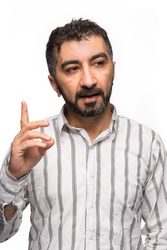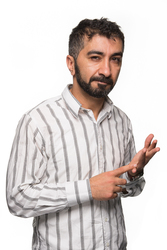Dr. Yavuz Aykan
École des Hautes Études en Sciences Sociales, Paris
Curriculum Vitae
Yavuz Aykan conducts research, inter alia, in the fields of Islamic Legal Doctrine and Mamluk and Ottoman Legal History. He studied history at Dokuz Eylul University in Izmir, as well as at Bogazici University in Istanbul. He subsequently received a Diplôme d'Études Approfondies (D.E.A.) at the Département d'histoire et civilisations, École des Hautes Études en Sciences Sociales in Paris, where he also obtained his doctorate degree in 2012 with a thesis on "Les acteurs de la justice à Amid et dans la province du Diyarbekir d'après les sicil provinciaux du 18e siècle".
From 2005 to 2012, Yavuz Aykan was Lecturer at the Institut national des langues et des civilisations orientales (INALCO) as well as at the Institut für den Nahen und Mittleren Osten at LMU Munich. From 2012 to 2013, Dr. Aykan was Fellow at the International Research Center IGK "Work and Human Lifecycle in Global History" at the Humboldt-Universität zu Berlin, where he conducted research on the construction of "persona types" in Islamic Legal Doctrine. From March to September 2013, Yavuz Aykan was Fellow at the Käte Hamburger Center for Advanced Study in the Humanities “Law as Culture”.
Research Project
Islamic Jurisprudence as Language of Debate in the Early-modern Ottoman Context
Dr. Yavuz Aykan’s research project traces the genealogies of the larger casuistic legacy that contributed to the construction of the Ottoman Hanafism in the early modern period. By paying particular attention to the issues of Apostasy, Sodomy and the question of Legal Faculty, it explores the ways in which the earlier Hanafi legal traditions (developed in the intellectual circles of the Transoxiana, the Golden Horde and the Greater Syria) were debated, re-interpreted and made operative by the Ottoman Hanafi jurists, in the form of casuistry, so as to constitute an Ottoman Hanafi doxa. Geographically, while the Ottoman Hanafi doxarests upon a larger intellectual tradition, the research project pays particular attention to the legal argumentations of specific “men” articulated in specific “texts” which greatly contributed to the early modern Ottoman sovereignty and state making.
Publications
- Property between life and death: A juridical debate over the property of a missing person (gha'ib) in eighteenth-century Ottoman Amid, in: Huri İslamoğlu, Safa Saraçoğlu (Eds.): Justice, Statecraft and Law: A New Ottoman Legal History (forthcoming).
- Unacknowledged Memory: The nineteenth century Ottoman Empire and the Ambivalence of National Memory in the Turkish Republic, in: Philip Kreyenbroek, Christine Allison (Eds.): Discourses of Memory in Iranian Cultures, Harrassowitz: Wiesbaden 2013.
- Comment al-hajj Mehmed s'est-il approprié un terrain récupéré de la décrue du Tigre? Le statut d'une terre vacante devant un tribunal ottoman (Amid au 18ème siècle), in: Sami Bargaoui, Simona Cerutti, Isabelle Grangaud (Eds.): Propriété et appartenance locale au nord et au sud de la Méditerranée à l'époque moderne, Actes du colloque de Tunis, 29-30 October 2010 (forthcoming).
- Encyclopaedia Entry "Mariage", in: le Dictionnaire de l'Empire ottoman (forthcoming with Fayard).




